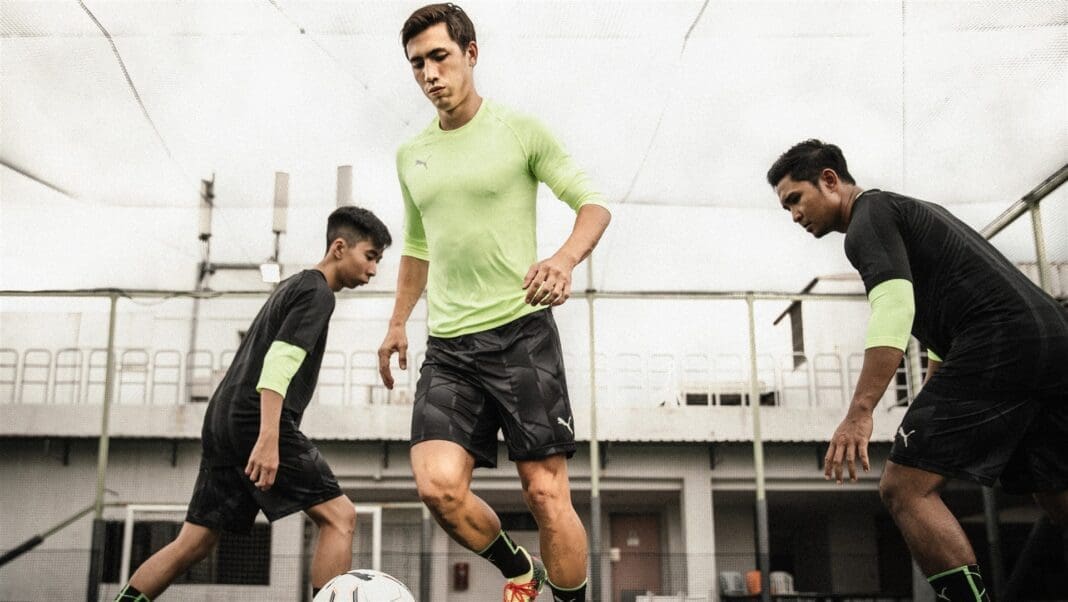“The pace of the game in Japan is very quick with a huge emphasis on technical and tactical competence.”
Many a Singaporean have complained about the relatively poor standards of Singapore football. J2 League club, Albirex Niigata has their B-team playing in the Singapore Premier League (also formerly known as the S-League) and have been romping to 3 consecutive league championships and also scooped up the last 4 Singapore Cups.
Despite the doom and gloom, there are shoots of positivity. Players are venturing out of the tiny red dot to neighbouring countries like Malaysia and Thailand to develop their talents. None have travelled further than Anders Aplin who have found his way to J2 League leaders, Matsumoto Yamaga, on a mid season loan. If he earns a contract with them next season, the J-league may be watching the first Singaporean to play for the Japanese top division – no easy feat.
BOOTHYPE speaks with Anders Aplin to find out how he made his way to the high reaches of Japan despite a relatively late start to his football career.
BOOTHYPE: Tell us more about yourself, Anders.
ANDERS APLIN: I’m 27 this year and I play centre back at Matsumoto Yamaga.
BH: How do you describe your playing style?
AA: I think the strongest aspect of my game is the physical aspect of it. I may not be as skillful as some of my peers but I think make up for it with aggression, determination and physicality. Being tactically disciplined is something I have learnt over the past season.


BH: How did you get started?
AA: It all started out kicking a foam ball in the living room at home when I was very young. My parents and brothers would also join in. We did smash a few mirrors along the way but it was great fun. I would regularly ask my parents to sign me up for kids’ soccer camps and just fell in love with the sport.
BH: Singapore’s support for developing football has been said to be modest. What kind of challenges did you face in your early years?
AA: The perennial issue in Singapore has been balancing sporting pursuits with academic demands. I spent my secondary school years at the Singapore Sports School where there was a huge emphasis on striking a balance between the two. It was the same at Victoria Junior College (VJC) where the culture was “study hard and train hard”.
BH: How important was your family’s role in helping you strike that balance?
AA: I come from a sporting family and they have always been very supportive. Both my mum and youngest brother have represented Singapore at the SEA Games (Badminton and Softball), while my Dad and second brother have played chess competitively for Singapore. My parents have never once told me to give up football.


BH: You signed your first pro contract only 2 years ago (2016). What were you doing before that?
AA: I had been playing in the National Football League (NFL) for a few years before I was called for a trial at Geylang International FC at the end of 2015. I signed for them in 2016 during my final year in university.
BH: Your first pro stint was at a relatively “old” age of 25. Did you feel different from the rest of your peers at Geylang?
AA: Starting professionally at 25 just meant that I had to work harder to make up for lost time. I spent almost 5 years playing at amateur level where it can get physical, literally the school of hard knocks. So those years did toughen me up a bit.
BH: Did you face any problems playing professionally in the Singapore Premier League (SPL)?
AA: Probably the contract durations were tough. I have teammates who wonder near the end of the season where they’ll be the following year. There’s hardly any sense of continuity. But there were good times. Winning the League Cup in 2016 was a real highlight for me.


BH: How did end up in Matsumoto Yamaga?
AA: I was sent here for a week’s trial at the start of the year as a result of the collaboration between Geylang, Yamaga and our corporate sponsor Epson. When the offer came during the mid-season window, I jumped on it. It wasn’t easy leaving Geylang halfway through the season but I think they were happy for me to go.
BH: How have you adapted to living in Japan?
AA: The biggest challenge especially during the first few weeks was adapting to their footballing culture and the language. The pace of the game here is very quick and there is a huge emphasis on technical and tactical competence. For example, the coaches would analyse videos of our matches and conduct correction training. Even simple warm up drills help us build up toward achieving the training objectives.
The training sessions are very detailed and meticulously planned. Also, the facilities and infrastructure in place here are ideal for football development. There’s a gym below the changing room for us to train. We also wear heart-rate monitors during sessions to track our progress. My new teammates players have been very welcoming as well.


BH: If the SPL could learn from Japanese football, what would it be?
AA: The players here start their development very young through academies, that’s why they are technically very sound. I feel some of the facilities we have (in the SPL) should be improved. Over here (in Japan), there are hot and cold baths to help our recovery, BFA machines to track our body composition, even the fields are well maintained. Of course, with tight resources in the SPL, it may be difficult to implement this at a club level. Fan engagement and community outreach is also something that Yamaga is serious about.
BH: The AFF Suzuki Cup is coming up soon and it overlaps with the final stretch of your J2 League season. Will your stint in Japan affect your availability for the Singapore National Team?
AA: As much as I relish my time training here in Japan, if the call up from the National Team comes I would drop everything here and answer the call. Nothing beats playing for the national team. I’m a patriot. I strongly believe that as a footballer, donning the national jersey is the greatest honour and privilege. Playing for Singapore has always been my ambition. I hope Singapore does well this year and we can claim a fifth title.
BH: How is it like playing under a legend like Fandi Ahmad?
AA: The players will be eager to impress. Coach Fandi is definitely someone all aspiring footballers in Singapore look up to. It would be great experience learning from someone who has reached the highest level.
If the call up from the National Team comes, I would drop everything here and answer the call. Nothing beats playing for the national team. I’m a patriot.
BH: What boots do you currently have on feet?
AA: I’ve been wearing the Puma Ones this season. Right now I use the Puma One 1 from the Illuminate Pack and the Puma One 18.1 Black/Red for trainings. For matches, it’s the Unisport x Puma Copenhagen City Pack Puma One 1 in black and yellow. I’m waiting for the London City Pack to arrive! I love the Puma Ones because it fits very well and it has a good balance between stability and flexibility. Of course, they look amazing too.
BH: Do you have a boot collection? Share with us some of your favourite pairs over the years.
AA: I’m a massive boot head! Even before I signed with Puma, I was wearing the Puma evoPower range. My favourite pair was the Puma evoPower 3D Vigor Blue which I got from Pro:Direct in London. It was the pair I wore when I got my first national cap, so there’s quite a bit of sentimental value in it and I’ve kept it on display ever since.
BH: Finally, some quick fire questions about your teammates. Who’s your best friend in football?
AA: Shawal Anuar. I’m just saying this so he won’t try and nutmeg me in training haha.
BH: Best player you’ve ever played with?
AA: Yuki Ichikawa from Geylang. I’ve learnt so much from him. I say he’s the best because he was someone I really looked up to when I first stepped foot in Geylang back in 2016. I was always observing him in training and asking him for advice. I wouldn’t be the player I am if not for his help.
BH: Best player you’ve played against?
AA: Faris Ramli. He’s embarrassed me a couple of times on the pitch before.
BH: Selfie King?
AA: Shawal for sure. I think he just discovered the wonders of Instagram this year.







